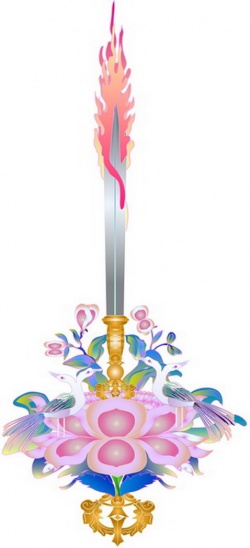Difference between revisions of "Tog Chöd"
(Created page with " We are trapped by our thoughts of the {{Wiki|past}} and the {{Wiki|future}}. They are like shadows following us, {{Wiki|obscuring}} the {{Wiki|light}} of the {{Wiki|...") |
|||
| (2 intermediate revisions by the same user not shown) | |||
| Line 1: | Line 1: | ||
| − | + | [[File:Manjushri-Möek.JPG|thumb|250px|]] | |
| Line 9: | Line 9: | ||
We hide in the shadows, full of {{Wiki|fear}} from the {{Wiki|past}} and expectation of the {{Wiki|future}}. Our [[conceptual mind]] keeps us in a [[hell]] of our [[own]] making. | We hide in the shadows, full of {{Wiki|fear}} from the {{Wiki|past}} and expectation of the {{Wiki|future}}. Our [[conceptual mind]] keeps us in a [[hell]] of our [[own]] making. | ||
| − | We need to cut our head! | + | We need to cut our head! |
| − | Tog [[Chöd]] is a powerful, dynamic practice. This [[dance | + | |
| + | We need [[Tog Chöd]]. | ||
| + | |||
| + | |||
| + | |||
| + | [[Tog Chöd]] is a powerful, dynamic practice. This [[dance with a sword]] brings us straight into the {{Wiki|present}} [[moment]]. | ||
We need to be brave to be in the {{Wiki|present}} [[moment]]. Its flowing movements are decisive and [[empowering]] as we stomp on our enemies, which are our [[own]] [[negative emotions]]. | We need to be brave to be in the {{Wiki|present}} [[moment]]. Its flowing movements are decisive and [[empowering]] as we stomp on our enemies, which are our [[own]] [[negative emotions]]. | ||
| Line 17: | Line 22: | ||
There are no enemies outside ourselves, and when we realize this we can stop struggling with the [[external world]] and learn to create our [[own]] [[reality]]. | There are no enemies outside ourselves, and when we realize this we can stop struggling with the [[external world]] and learn to create our [[own]] [[reality]]. | ||
| − | But, even then, our biggest [[obstacle]] is | + | But, even then, our biggest [[obstacle]] is [[laziness]]. |
| − | [[ | + | Through [[Tog Chöd]] we come to know our inner power and in this way we overcome our [[laziness]]. |
| − | |||
| − | |||
| − | + | [[Tulku Lobsang]] himself developed [[Tog Chöd]]. | |
| − | Wielding this sword we cut through our [[conceptual mind]]. We cut our [[thoughts]] of {{Wiki|fear}} and expectations that keep us from being in this beautiful this {{Wiki|present}} [[moment]]. | + | |
| + | |||
| + | It is based on the [[traditional Yaman monk dances]] and [[Kalachakra movements]], but created in direct response to the needs of those of us in the {{Wiki|modern}} [[world]]. | ||
| + | |||
| + | We need a practice to [[release]] us from our [[conceptual mind]], a practice that connects us with our power. [[Tog Chöd]] uses our [[anger]] to [[empower]] our [[motivation]], but the deep [[motivation]] is always [[compassion]]. | ||
| + | |||
| + | |||
| + | |||
| + | The [[sword]] [[symbolizes]] our [[own innate wisdom]]. | ||
| + | |||
| + | |||
| + | |||
| + | Wielding this [[sword]] we cut through our [[conceptual mind]]. We cut our [[thoughts]] of {{Wiki|fear}} and expectations that keep us from being in this beautiful this {{Wiki|present}} [[moment]]. | ||
With [[wisdom]] we can [[transform]] our [[negative emotions]] and truly change ourselves. We only need to decide to do it. | With [[wisdom]] we can [[transform]] our [[negative emotions]] and truly change ourselves. We only need to decide to do it. | ||
| + | |||
| + | |||
| + | |||
| + | {{R}} | ||
| + | [[Category:Buddhist Terms]] | ||
| + | [[Category:Buddhist Practices]] | ||
| + | [[Category:Chöd]] | ||
| + | [[Category:Vajrayana]] | ||
| + | [[Category:Tantric practices]] | ||
| + | [[Category:Machig Labdrön]] | ||
Latest revision as of 16:50, 13 July 2021
We are trapped by our thoughts of the past and the future. They are like shadows following us, obscuring the light of the present moment.
We hide in the shadows, full of fear from the past and expectation of the future. Our conceptual mind keeps us in a hell of our own making.
We need to cut our head!
We need Tog Chöd.
Tog Chöd is a powerful, dynamic practice. This dance with a sword brings us straight into the present moment.
We need to be brave to be in the present moment. Its flowing movements are decisive and empowering as we stomp on our enemies, which are our own negative emotions.
There are no enemies outside ourselves, and when we realize this we can stop struggling with the external world and learn to create our own reality.
But, even then, our biggest obstacle is laziness.
Through Tog Chöd we come to know our inner power and in this way we overcome our laziness.
Tulku Lobsang himself developed Tog Chöd.
It is based on the traditional Yaman monk dances and Kalachakra movements, but created in direct response to the needs of those of us in the modern world.
We need a practice to release us from our conceptual mind, a practice that connects us with our power. Tog Chöd uses our anger to empower our motivation, but the deep motivation is always compassion.
The sword symbolizes our own innate wisdom.
Wielding this sword we cut through our conceptual mind. We cut our thoughts of fear and expectations that keep us from being in this beautiful this present moment.
With wisdom we can transform our negative emotions and truly change ourselves. We only need to decide to do it.
